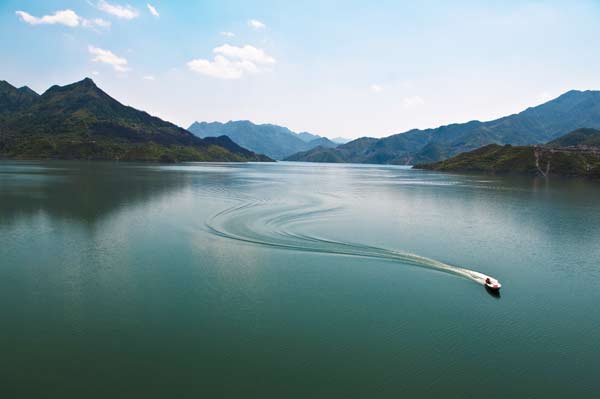 |
|
The Shanxi Reservoir in Wenzhou, Zhejiang province, takes on a new look after eff orts by authorities to clean up the area. PROVIDED TO CHINA DAILY |
Concerted efforts to restore reservoir area shine out in nationwide environmental campaign, reports Wang Qian in Wenzhou, Zhejiang province.
|
Getting help from nature Besides strict environmental protection of the Shanxi reservoir area to guarantee safe drinking water in Wenzhou, Zhejiang province, local authorities are also observing the behavior of its fish to evaluate water quality. Teng Yunan, an engineer with Zhaoshandu reservoir, 35 kilometers downstream from the Shanxi reservoir, will check the condition of the red koi in a test pond, monitor data on water quality and decide whether the water is clean enough to be supplied to Wenzhou residents. "Koi requires high water quality to survive. A little contamination will kill them or cause them to act abnormally," Teng said. The fish in the pond have been in good condition since they were moved there in 2012, he said. Besides a 24-hour monitoring system on water quality, Wang Zhenyong, director of the Wenzhou water resources bureau, said wastewater and garbage treatment factories will help clean up the reservoir area before the end of 2014. Five sewage plants and 112 garbage collection sites are also being built to prevent wastewater and garbage from being dumped in the river, he said. A sewage plant with a daily treatment capacity of 15,000 metric tons is expected to be built in September in Juyu town, Zhejiang. "After biological treatment, the water can be directly discharged into river," the plant's project manager, Liu Weirong, said. These efforts to restore the environment in the reservoir area mean Wenzhou residents will have access to the cleanest drinking water, Wang said. |
But since February, the 54-year-old has been running a recreational village for tourists instead.
The village had been home to more than 200 pigs. But last year, the pigpens were demolished to help protect the Shanxi reservoir area.
Zhao, 54, became one of Huangtan township's residents who had to find another way to make a living with the changes.
He decided to open a restaurant in the village first. The three-story eatery has since been doing brisk business, with at least 200 diners a day.
"Besides the restaurant, a water park and several log cabins are also being built," Zhao said.
He is confident that the clean water and green mountains being maintained in the area will help boost tourism in Huangtan, in turn generating revenue for his new business.
The reservoir, which has a storage capacity of more than 1.8 billion cubic meters, is a crucial water source in the area, supplying 70 percent of the population in Zhejiang's economic powerhouse of Wenzhou alone.
Zhao, who used to rake in about 2 million yuan ($325,400) a year from farming and producing feed, said sacrificing the stability of his former livelihood for the quality of the water piped to the population of 5 million downstream is "well worth it".
The former farmer's optimism reflects the general attitude of most people affected by the local authorities' move to clean up the area's water resources. Many residents, increasingly aware of the costs of pollution, are now warming up to the environmental initiatives, which are also beginning to see positive results.
Xue Lezhi, head of Huangtan township, said the local government will provide free training and consultation and allocate subsidies for people who start new businesses instead of farming poultry, to protect the Shanxi reservoir region.
Wenzhou authorities are also providing 20 million yuan in subsidies for five consecutive years starting this year, its water resources bureau said.
Xing Meixiang, a migrant from the reservoir protection zone, was excited about the training. She moved to Juyu township in the reservoir area and became a needlewoman, earning at least 2,000 yuan a month.
"Now my income is stable and the environment is attractive," Xing said.
Wang Zhenyong, head of Wenzhou's water resources bureau, said that by the end of 2016, all the residents in the reservoir area will enjoy reliable incomes and improved living conditions.
Waste from pig farming in the reservoir area was also a problem.
But in the one and a half years since the Wenzhou government's massive green campaign, the number of pigs in the area has dropped from 242,100 to the current 16,600, authorities said.
